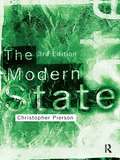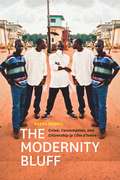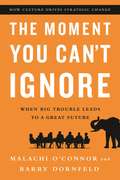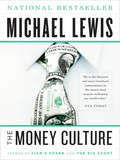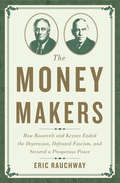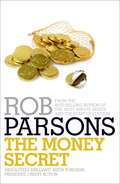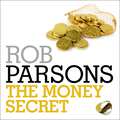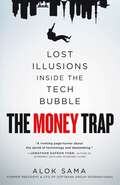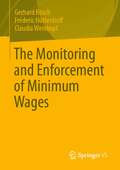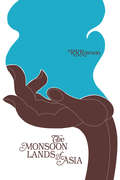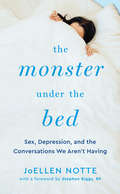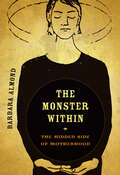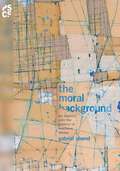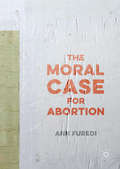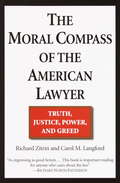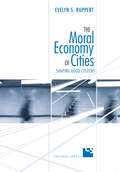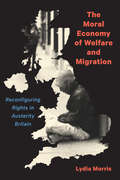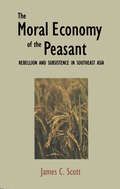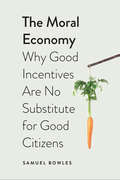- Table View
- List View
The Modern State
by Christopher PiersonThe new edition of this well-established and highly regarded textbook continues to provide the clearest and most comprehensive introduction to the modern state. It examines the state from its historical origins at the birth of modernity to its current jeopardized position in the globalized politics of the 21st Century. The book has been entirely revised and updated throughout, including substantial new material on the financial crisis and the environment. Subjects covered include: • The evolution of the state system • Placing the state in modernity• States and societies • State and economy • States and citizens • States and the international order • States of the twenty-first century This book is essential reading for all those studying the state, international relations and comparative politics.
The Modernity Bluff: Crime, Consumption, and Citizenship in Côte D'Ivoire
by Sasha NewellIn Côte d’Ivoire, appearing modern is so important for success that many young men deplete their already meager resources to project an illusion of wealth in a fantastic display of Western imitation, spending far more than they can afford on brand name clothing, accessories, technology, and a robust nightlife. Such imitation, however, is not primarily meant to deceive—rather, as Sasha Newell argues in The Modernity Bluff, it is an explicit performance so valued in Côte d’Ivoire it has become a matter of national pride. Called bluffeurs, these young urban men operate in a system of cultural economy where reputation is essential for financial success. That reputation is measured by familiarity with and access to the fashionable and expensive, which leads to a paradoxical state of affairs in which the wasting of wealth is essential to its accumulation. Using the consumption of Western goods to express their cultural mastery over Western taste, Newell argues, bluffeurs engage a global hierarchy that is profoundly modern, one that values performance over authenticity—highlighting the counterfeit nature of modernity itself.
The Modernity Bluff: Crime, Consumption, and Citizenship in Côte d’Ivoire
by Sasha NewellIn Côte d’Ivoire, appearing modern is so important for success that many young men deplete their already meager resources to project an illusion of wealth in a fantastic display of Western imitation, spending far more than they can afford on brand name clothing, accessories, technology, and a robust nightlife. Such imitation, however, is not primarily meant to deceive—rather, as Sasha Newell argues in The Modernity Bluff, it is an explicit performance so valued in Côte d’Ivoire it has become a matter of national pride. Called bluffeurs, these young urban men operate in a system of cultural economy where reputation is essential for financial success. That reputation is measured by familiarity with and access to the fashionable and expensive, which leads to a paradoxical state of affairs in which the wasting of wealth is essential to its accumulation. Using the consumption of Western goods to express their cultural mastery over Western taste, Newell argues, bluffeurs engage a global hierarchy that is profoundly modern, one that values performance over authenticity—highlighting the counterfeit nature of modernity itself.
The Moment You Can't Ignore: When Big Trouble Leads to a Great Future
by O'ConnorNot just another day at the office . . . or is it? The surgical technician ducks as a stapler flies past his head during the concluding moments of a lengthy and difficult operation. . . . The high-powered, internationally known finance guru seeks to turn fortunes around at the university of which he is now president . . . and finds himself a leader without followers. . . . The powerful satraps silently sabotage the CEO’s desperately needed growth initiative. . . . These are "moments that cannot be ignored”--events, actions, comments that stop people in their tracks and, in one fell swoop, make it blindingly clear that an organization is stuck and unable to move forward. And they have become regular occurrences in today’s corporations, non-profits, and educational institutions as new forms of work, communication, and technology expose the ways in which an organization’s culture--or "the way we do things around here”--conflicts with new competitive demands. The result: telling incidents--all too visible elephants in the room--that reveal underlying conflicts as well as hidden assets. In The Moment You Can’t Ignore, Malachi O’Connor and Barry Dornfeld tell fascinating "you are there” stories of people and organizations as they encounter and then navigate through and beyond these un-ignorable moments, and show what we can learn from them. They outline the big questions organizations need to ask themselves about identity, leadership, and the capacity to innovate that an understanding of culture can help answer, and deliver powerful insights into recognizing and harnessing hidden assets that point in the direction of a new future. In our age of porous organizations and constant change, The Moment You Can’t Ignore demonstrates that the adage, "culture eats strategy for lunch,” is more relevant now than ever.
The Money Culture
by Michael LewisThe classic warts-and-all portrait of the 1980s financial scene. The 1980s was the most outrageous and turbulent era in the financial market since the crash of '29, not only on Wall Street but around the world. Michael Lewis, as a trainee at Salomon Brothers in New York and as an investment banker and later financial journalist, was uniquely positioned to chronicle the ambition and folly that fueled the decade.
The Money Makers: How Roosevelt and Keynes Ended the Depression, Defeated Fascism, and Secured a Prosperous Peace
by Eric RauchwayShortly after assuming office in early 1933, Franklin D. Roosevelt made the bold decision to take the United States off the gold standard. This was only the first act in his quest to use monetary policy as a political tool. In The Money Makers, the distinguished historian Eric Rauchway shows how FDR and his brilliant team of advisers--John Maynard Keynes, Harry Dexter White, and Cordell Hull--paved the way for economic recovery. By responding decisively to the Great Depression at home, they warded off indigenous fascist movements and ensured an Allied victory in World War II, laying the foundation for decades of global peace and prosperity.Capturing not only the contentious debates among these headstrong figures but also the spirit of innovation that united them, Rauchway argues that we have forgotten their accomplishments. One result is that our modern preference for monetary stability over economic growth has led to stagnation and rising inequality. By uncovering the origins of midcentury economic success, Rauchway shows how we can recapture prosperity for our own age.
The Money Secret
by Rob ParsonsPractical and life-changing, THE MONEY SECRET will totally revolutionise your attitude to money and show how it can either be the source of freedom and happiness or a burden of guilt and debt. When you have finished this powerful story you will want to cut up your credit cards forever and rid yourself of the power of the banks and lenders and advertisers who dupe us all into a spending frenzy based on false promises and slick delusions. As well as offering solutions this book will challenge the status quo and question current spending habits. Rich or poor, we have all at some time felt in despair about money and its power over our lives. Rob Parsons shows a new way forward which will change your life, focus your priorities and put you back in control.
The Money Secret
by Rob ParsonsThe essential audiobook from top selling author, Rob Parsons, relevant to anyone who wants to find happiness through financial freedom.Practical and life-changing, THE MONEY SECRET will totally revolutionise your attitude to money and show how it can either be the source of freedom and happiness or a burden of guilt and debt. When you have finished this powerful story you will want to cut up your credit cards forever and rid yourself of the power of the banks and lenders and advertisers who dupe us all into a spending frenzy based on false promises and slick delusions. As well as offering solutions this book will challenge the status quo and question current spending habits. Rich or poor, we have all at some time felt in despair about money and its power over our lives. Rob Parsons shows a new way forward which will change your life, focus your priorities and put you back in control.The contents of The Biscuit Tin are available in the accompanying PDF. (P)2005 Hodder & Stoughton
The Money Trap: Lost Illusions Inside the Tech Bubble
by Alok SamaA gripping and entertaining memoir that shines a rare light on an industry that is disrupting our lives.Veteran Morgan Stanley banker Alok Sama thought he'd seen it all. Then he found himself chief dealmaker at the most influential technology investor in the world—SoftBank, the backer of Arm Holdings, Yahoo, Nvidia, TikTok, Uber, T-Mobile, Alibaba and WeWork.The Money Trap is Sama’s thrilling, stranger-than-fiction personal odyssey featuring his experiences alongside SoftBank’s iconic founder, Masayoshi Son, a visionary maverick who wants to be remembered as “the crazy guy who bet on the future” and whose mission is “happiness for everyone.” Sama takes the reader on a wild journey as he consorts with A-list CEOs and heads of state, and negotiates mega-deals on a Gulfstream jet, Son’s sanctuary with its exquisite Japanese garden, and a waterside restaurant in the Turkish Riviera—all while contending with a mysterious dark-arts smear campaign that takes a toll on his private life.This fascinating and humorous saga provides a unique insider perspective on the insanity of high finance and venture investing. Written with self-deprecating wit, unflinching honesty and searing introspection, The Money Trap is ultimately a morality tale: in life, as in technology investing, more money isn’t always the answer.
The Mongolian People's Republic: Toward a Market Economy
by Franek Rozwadowski Elizabeth Milne John Edward Leimone Padej SukachevinThis paper is based on an IMF staff report prepared in connection with the application of the Mongolian People's Republic (Mongolia) for membership in the International Monetary Fund. It reviews Mongolia's political and economic history, highlighting its changing economic structure following World War II and its recent efforts to introduce market mechanisms.
The Monied Metropolis: New York City and the Consolidation of the American Bourgeoisie, 1850-1896
by Sven BeckertTracing the shifting fortunes and changing character of New York City's economic elite over half a century, Sven Beckert brings to light a neglected--and critical--chapter in the social history of the U. S. : the rise of an American bourgeoisie. The Monied Metropolis is the first comprehensive history of New York's economic elite, the most powerful group in nineteenth-century America. Beckert explains how a small and diverse group of New Yorkers came to wield unprecedented economic, social, and political power from 1850 to the turn of the twentieth century. He reveals the central role of the Civil War in realigning New York's economic elite, and how the New York bourgeoisie reoriented its ideology during Reconstruction, abandoning the free labor views of the antebellum years for laissez-faire liberalism. Sven Beckert is the Dunwalke Associate at Harvard University. He is the recipient of several honors and fellowships, including the Aby Warburg Foundation prize for academic excellence, a MacArthur Dissertation Fellowship and a Andrew W. Mellon fellowship. This is his first book.
The Monitoring and Enforcement of Minimum Wages
by Gerhard Bosch Frederic Hüttenhoff Claudia WeinkopfThe book presents the results of the first comprehensive empirical study on the control of minimum wages in Germany. It offers an overview of the challenges and problems of enforcement and compliance with minimum wages, taking three sectors as examples (construction, meat industry, hospitality). On the basis of numerous interviews with experts from the field (e.g. trade unions, employers' associations, customs) and a comprehensive evaluation of the broad international research literature, it identifies starting points and strategies for sustainably improving compliance with and enforcement of minimum wages.
The Monochrome Society (New Forum Books #24)
by Amitai EtzioniAmitai Etzioni is one of the most influential social and political thinkers of our day, a man synonymous with the ideas of communitarianism. In this book, Etzioni challenges those who argue that diversity or multiculturalism is about to become the governing American creed. On the surface, America may seem like a fractured mosaic, but the country is in reality far more socially monochromatic and united than most observers have claimed. In the first chapter, Etzioni presents a great deal of evidence that Americans, whites and African Americans, Hispanics and Asian Americans, new immigrants and decedents of the Pilgrims, continue to share the same core of basic American values and aspirations. He goes on to show that we need not merely a civil but also a good society, one that nurtures virtues. He assesses key social institutions that can serve such a society ranging from revived holidays to greater reliance on public shaming. The most effective sources of bonding and of shared ideas about virtue, he insists throughout, come from the community, not from the state. Etzioni also challenges moral relativists who argue that we have no right to "impose" our moral values on other societies. He responds to those who fear that a cohesive community must also be one that is oppressive, authoritarian, and exclusive. And he explores and assesses possible new sources and definitions of community, including computer-mediated communities and stakeholding in corporations. By turns provocative and reassuring, the chapters here cut to the heart of several of our most pressing social and political issues. The book is further evidence of Etzioni's enduring place in contemporary thought.
The Monsoon Lands of Asia
by Gadi BenEzerAccording to the author a geographic region must satisfy the following conditions: however striking the diversity of the physical setting and the languages, religions and general appearance of the people, there must be some aspect of culture (for example, the social outlook or the organization of the economy) which pervades the area in such a way as to justify the recognition and study of that area as one entity and there must be substantial cultural differences between it and adjacent areas.Monsoon Asia, from Pakistan to Japan is more than a land area and an assemblage of countries: it is a distinctive geographical region. Its population--which includes nearly half the people in the world--is mainly rural, its economy mainly agricultural, and its peoples share a heritage of material poverty. But change is apparent everywhere in the area. This book is a compact and lucid introduction to the dynamic as well as the unchanging characteristics of the region.After an introductory section, which defines the limits of Monsoon Asia, there follow chapters on structure and relief, climate, vegetation, and soils. A discussion of the historical geography of the region leads into studies of its agriculture and industry. The concluding two-thirds of the book survey the characteristics of the constituent countries--India, Pakistan, Ceylon, China, Japan, Korea, and South-East Asia proper (Burma, Malaya, Thailand, Indonesia, the Philippines, etc.).Special attention is paid throughout to the political and social setting of current political problems. The book contains 17 plates, 48 maps and diagrams, a selected bibliography, and an index.
The Monster Under the Bed: Sex, Depression, and the Conversations We Aren't Having
by JoEllen NotteAlmost everyone has had some interaction with depression. Whether it's you, a family member, a friend, or a partner who is affected, depression has the potential to touch us all. Even so, many of us don't know how to handle depression becoming part of our love life and it can quickly become the monster under the bed. From "you have to love yourself first," to "don't stick it in the crazy," to dead silence, popular responses to the topic leave much to be desired. But you're not alone and you can have successful relationships and satisfying sex with depression. JoEllen Notte will help you understand how sexual function is affected by depression and what keeps us from effectively addressing it. Heavily informed by the author's research, including surveys of over 1,000 people and interviews with close to 200, this is the first book of its kind. With practical tips and real-life examples, this is both a guidebook for people with depression and the people who love them, as well as a reference tool for mental health professionals.
The Monster Within: The Hidden Side of Motherhood
by Barbara AlmondMixed feelings about motherhood—uncertainty over having a child, fears of pregnancy and childbirth, or negative thoughts about one’s own children—are not just hard to discuss, they are a powerful social taboo. In this beautifully written book, Barbara Almond brings this troubling issue to light. She uncovers the roots of ambivalence, tells how it manifests in lives of women and their children, and describes a spectrum of maternal behavior—from normal feelings to highly disturbed mothering. In a society where perfection in parenting is the unattainable ideal, this compassionate book also shows how women can affect positive change in their lives.
The Montessori Movement in Interwar Europe: New Perspectives
by Christine QuarfoodThis book explores how the Montessori movement developed a cultural critique and gained momentum during the interwar years of political turbulence. Drawing on archival sources, press material and Montessori's literary output, the book provides a multifaceted analysis of this significant educational movement. The first two chapters presents the scientific background, how Montessori's innovative method offered new solutions to age-old problems of teacher-pupil interaction. The following chapters focus on the social and psycho-pedagogical aspects of Montessorism, and how the movement's culture-critical message about the child's liberation was received and reinterpreted in the wider European public debate. The last four chapters shed new light on the politicisation of Italian Montessorism during the problematic Montessori-Mussolini alliance, 1924-1934.
The Moral Background: An Inquiry into the History of Business Ethics (Princeton Studies in Cultural Sociology #60)
by Gabriel AbendIn recent years, many disciplines have become interested in the scientific study of morality. However, a conceptual framework for this work is still lacking. In The Moral Background, Gabriel Abend develops just such a framework and uses it to investigate the history of business ethics in the United States from the 1850s to the 1930s.According to Abend, morality consists of three levels: moral and immoral behavior, or the behavioral level; moral understandings and norms, or the normative level; and the moral background, which includes what moral concepts exist in a society, what moral methods can be used, what reasons can be given, and what objects can be morally evaluated at all. This background underlies the behavioral and normative levels; it supports, facilitates, and enables them.Through this perspective, Abend historically examines the work of numerous business ethicists and organizations—such as Protestant ministers, business associations, and business schools—and identifies two types of moral background. "Standards of Practice" is characterized by its scientific worldview, moral relativism, and emphasis on individuals' actions and decisions. The "Christian Merchant" type is characterized by its Christian worldview, moral objectivism, and conception of a person's life as a unity.The Moral Background offers both an original account of the history of business ethics and a novel framework for understanding and investigating morality in general.
The Moral Case for Abortion
by Ann FurediThis thought-provoking book sets out the ethical arguments for a woman’s right to choose. Drawing on the traditions of sociological thinking and moral philosophy, it maintains that there is a strong moral case for recognizing autonomy in personal decision-making about reproductive intentions. More than this, it argues that to prevent a woman from making her own choice to continue or end her pregnancy is to undermine the essence of her humanity. The author, a provider of abortion services in the UK, asserts that true respect for human life and true regard for individual conscience demand that we respect a woman’s right to decide, and that support for a woman’s right to a termination has moral foundations and ethical integrity. This fresh perspective on abortion will interest both pro- and anti-choice individuals and organizations, along with academics in the fields of gender studies, philosophy, ethics and religion.
The Moral Case for Abortion: A Defence of Reproductive Choice
by Ann FurediThis revised and updated edition of the 2016 bestselling work sets out the moral arguments for a woman’s right to decide the future of her pregnancy. Drawing on traditions of philosophical and sociological thinking, it presents the case for recognizing autonomy in personal, private decision-making about reproductive intentions. Further, it argues that to prevent a woman making this decision according to her own values is to undermine the essence of her humanity. The author explores how true respect for human life and regard for individual conscience demands that we support a woman’s right to decide, and that support for her right to terminate her pregnancy has moral foundations and ethical integrity. This second edition features a foreword by US abortion provider and reproductive justice advocate Dr. Willie Parker, as well as additional chapters that consider the rights of doctors and nurses to withdraw from abortion provision on grounds of conscience. Furedi also surveys the rapidly changing landscape of the abortion debate, including the rights of women in the aftermath of Trump's presidency; debates, politics and religion in Northern Ireland and the Republic of Ireland; and the differing levels of provision across Europe.
The Moral Compass of the American Lawyer
by Richard A. Zitrin Carol M. LangfordThese are perilous times for Americans who need access to the legal system. Too many lawyers blatantly abuse power and trust, engage in reckless ethical misconduct, grossly unjust billing practices, and dishonesty disguised as client protection. All this has undermined the credibility of lawyers and the authority of the legal system. In the court of public opinion, many lawyers these days are guiltier than the criminals or giant corporations they defend.Is the public right? In this eye-opening, incisive book, Richard Zitrin and Carol Langford, two practicing lawyers and distinguished law professors, shine a penetrating light on the question everyone is asking: Why do lawyers behave the way they do? All across the country, lawyers view certain behavior as "ethical" while average citizens judge that same conduct "immoral." Now, with expert analysis of actual cases ranging from murder to class action suits, Zitrin and Langford investigate lawyers' behavior and its impact on our legal system. The result is a stunningly clear-eyed exploration of law as it is practiced in America today--and a cogent, groundbreaking program for legal reform.From the Trade Paperback edition.
The Moral Economy of Cities
by Evelyn S. RuppertWhat makes a good city? This question has long preoccupied groups interested and involved in the making and remaking of city spaces. In The Moral Economy of Cities, Evelyn S. Ruppert contends that the vision of the 'good city' embraced by professionals in the business of city making recognizes the interests of a dominant public, namely middle class consumers, office workers, tourists, and families. This vision stigmatizes certain members of the public like street youth, panhandlers, discount- and low-income shoppers, and the language used to extol the virtues of the good city inherently moralizes social conduct in the city.Using the redevelopment of the Yonge-Dundas intersection in downtown Toronto in the mid-1990s as a case study, Ruppert examines the language of planners, urban designers, architects, and marketing analysts to reveal the extent to which moralization legitimizes these professions in the public eye and buttresses the very projects they produce. Ruppert's conclusion that economic practices are not free from moral investment encourages the considerable task of re-examining the implications of city planning and development worldwide. The Moral Economy of Cities is mandatory reading for urban studies scholars and practitioners, and their critics. Disclaimer: Images removed at the request of the rights holder
The Moral Economy of Welfare and Migration: Reconfiguring Rights in Austerity Britain
by Lydia MorrisBritain's coalition government of 2010–2015 ushered in an enduring age of austerity and a "moral mission" of welfare reform as part of a drive for deficit reduction. Stricter controls were applied to both domestic welfare and international migration and asylum, which were presented as two sides of the same coin. Policy in both areas has engaged a moral message of earned entitlement and invites a sociological approach that examines such policies in combination, alongside their underpinning moral economy.Exploring the idea of a moral economy – from its original focus on popular rebellion at the rising price of corn to more contemporary analysis of measures that seek to impose moral values from above – Lydia Morris examines Britain's reconfigured pattern of rights in the fields of domestic welfare and migration. Those in power have claimed that heightened conditions and sanctions for the benefit-dependent domestic population, both in and out of work, will promote labour market change and reduce demand for low-skilled migrant workers, often EU citizens, whose own access to benefits was curtailed prior to Brexit. Morris traces related political discourse through to the design and implementation of concrete policy measures and maps the diminished access to rights that has emerged, paying particular attention to the boundaries drawn in defining target groups, and the resistance this has provoked.The Moral Economy of Welfare and Migration considers the topology of the whole system to highlight cross-cutting devices of control that have far-reaching implications for how we are governed as a total population.
The Moral Economy of the Peasant
by James C. ScottJames C. Scott places the critical problem of the peasant household-subsistence-at the center of this study. The fear of food shortages, he argues persuasively, explains many otherwise puzzling technical, social, and moral arrangements in peasant society, such as resistance to innovation, the desire to own land even at some cost in terms of income, relationships with other people, and relationships with institutions, including the state.Once the centrality of the subsistence problem is recognized, its effects on notions of economic and political justice can also be seen. Scott draws from the history of agrarian society in lower Burma and Vietnam to show how the transformations of the colonial era systematically violated the peasants' "moral economy" and created a situation of potential rebellion and revolution.Demonstrating keen insights into the behavior of people in other cultures and a rare ability to generalize soundly from case studies, Scott offers a different perspective on peasant behavior that will be of interest particularly to political scientists, anthropologists, sociologists, and Southeast Asianists."The book is extraordinarily original and valuable and will have a very broad appeal. I think the central thesis is correct and compelling."-Clifford Geertz "In this major work, ... Scott views peasants as political and moral actors defending their values as well as their individual security, making his book vital to an understanding of peasant politics."-Library Journal James C. Scott is professor of political science at Yale University.
The Moral Economy: Why Good Incentives Are No Substitute for Good Citizens
by Samuel BowlesShould the idea of economic man--the amoral and self-interested Homo economicus--determine how we expect people to respond to monetary rewards, punishments, and other incentives? Samuel Bowles answers with a resounding "no. " Policies that follow from this paradigm, he shows, may "crowd out" ethical and generous motives and thus backfire. But incentives per se are not really the culprit. Bowles shows that crowding out occurs when the message conveyed by fines and rewards is that self-interest is expected, that the employer thinks the workforce is lazy, or that the citizen cannot otherwise be trusted to contribute to the public good. Using historical and recent case studies as well as behavioral experiments, Bowles shows how well-designed incentives can crowd in the civic motives on which good governance depends.
